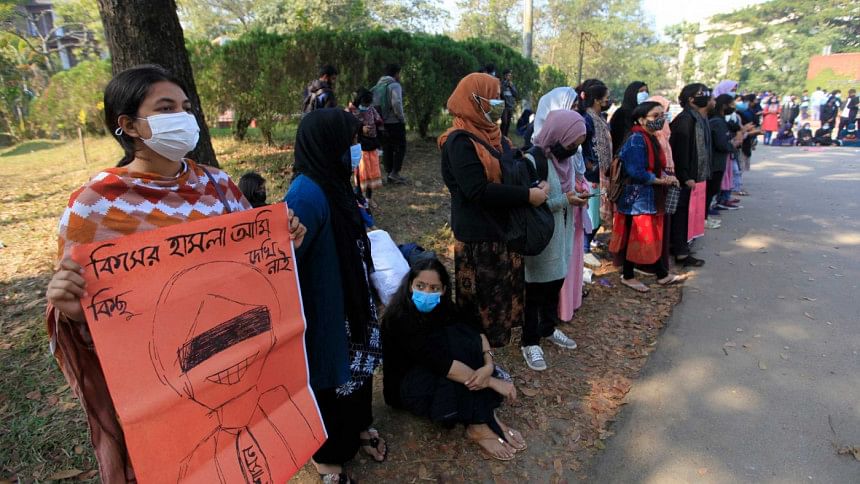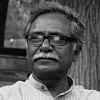Free our universities of suppression and violence

It is a matter of common sense that a university is supposed to create space and opportunities to generate knowledge, open up scopes for creative ideas and thinking, invite questions against the existing knowledge and system, and raise voices against injustice, discrimination and oppression. From this perspective, students and teachers walk the same path, where teachers have a greater responsibility to ensure a proper environment and create the space for students to become active thinkers. Teachers should be friends, philosophers and guides to their young students, and also be open to questions and differences of opinions.
Unfortunately, we are witnessing a completely different scenario in Bangladesh now, where critical thinking and voices raised against injustice and corruption are suppressed even at public universities. The recent incident of Shahjalal University of Science and Technology (SUST) is a reflection of that.
This is how it started: female students of SUST were peacefully demanding solutions to some long-standing problems regarding daily meals and the environment of the halls. But the situation snowballed quickly as the residential hall authorities and university administration responded first with misbehaviour, then with threat, and then by unleashing ruling party activists and later police on the students.
A university administration is supposed to look after the well-being of its students. But in our universities, as far as the administration is concerned, they look at students through the lens of power. The vast majority of students are of little importance to the administration. But then there is a small section of students affiliated with the student wing of the ruling party, who terrorise the campus, forcibly occupy the residential halls or control the distribution of seats in the halls, and so on. This group is seen to be in close terms with the administration. The latter uses the former in various ways to protect their own interests, and as such, succumbs to all their demands.
University authorities are supposed to maintain close relations with all their students, and be responsive to all their problems. But it is unfortunate that when university students in Bangladesh voice legitimate issues or concerns that affect them, teachers and the university administrations either ignore them or react with annoyance or anger to their plight. On the other hand, when it comes to the terror tactics employed by the ruling party activists, the administration is conspicuously silent. Rather, they hand over the control of the halls to the student wing of the ruling party and allow them to extort money from various construction projects and surrounding areas. This discrimination is rampant in all university campuses across this country. We saw this tragic situation take a horrible turn when we saw police suppression of student protests with the permission of or at the behest of the administration.
It is inconceivable that teachers can endorse violent attacks on their own students. It is possible that students might have problems with some of their teachers. But the role of a teacher is to listen to the students' grievances and engage with them in a constructive manner. Instead of doing that, they allowed students to be attacked—not just by the police, but also by the student activists of the ruling party.
If we are to believe that the SUST administration was not involved in the attack on the students, they should take action against the perpetrators. However, no action has yet been taken against the attackers. This proves that the attacks were directly or indirectly provoked by the administration. It can't be an acceptable norm for a university administration to unleash ruling party activists on students one day or police the next day.
We have seen university VCs in our country—the kind that we want to lead the highest institutions of education—who resigned from their post after state forces stormed into campus and attacked students. That's what the role of the VC should be. A VC is a teacher—they are not a member of the police or military. A VC is someone who should give the utmost importance to the students, who should talk to the students, who ensures that there is no terrorist or police attacks on the students. However, the main problem in our country is that the government wants the type of intuitional heads who will be loyal to them and implement all of their plans without question. Nowadays, the prerequisite for a VC is being able to surrender all of their self-esteem and being ready to work closely with corrupt, irresponsible and anti-people groups. Big construction projects have become the main area of interest for university administrations, ruling party bosses and their student leaders. The priorities of education and student interests are not on their agenda.
No university administration has taken any measures against criminals and the corrupt, or against violence committed by ruling party leaders. What they do is use the cadres for their own benefit, and if they face a difficult situation, they close down the university. Closing down the university is not the answer. Those who find solutions in doing so are not qualified to run university operations.
This problem exists all over Bangladesh. VCs and administrations are flexible towards the powers that be and rigid towards the student bodies. When students protest against injustice and corruption, they respond with anger and violence, with the help of political cadres and state forces. That cannot be the environment of a university where learning and free thinking is valued.
Universities should be run by putting knowledge-sharing and the interests of general students at the forefront. Therefore, teachers should be teachers first and last. The SUST authorities should reopen the university soon after meeting all the demands voiced by the students, and ensure an environment appropriate for higher learning.
Anu Muhammad is a professor of economics at Jahangirnagar University.

 For all latest news, follow The Daily Star's Google News channel.
For all latest news, follow The Daily Star's Google News channel. 



Comments